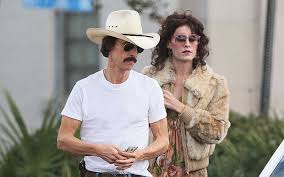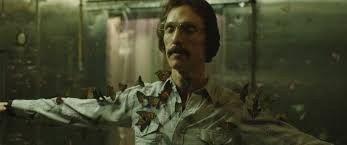This week I rented Dallas Buyers Club. I didn’t know much about the film, except
that it had something to do with AIDS and that Matthew McConaughey won an
Academy Award for Best Actor. If you
have not seen the film, the following may be a bit of a spoiler, but I did find
a redeeming theological theme running through the movie, which I felt moved to
comment on.
The story revolves around Ron Woodroof who ends up
contracting HIV and then AIDS through unprotected sex. This guy is something else, and it’s hard
not to have a bit of judgment on his hedonistic lifestyle choices. Living in Texas and an electrician by trade,
everything about him screams “white trash”—the jokes he tells with his friends
(as well as his language and every other word out of his mouth starting with
F---), his prejudice against “faggots,” his involvement in Texas Rodeo, his
sexual involvement with multiple partners, the drugs, the booze. And everything is done to the extreme. There’s no moderation for this guy.
We get a peek into his character early on. He gets a friend to ride the bull in a
rodeo, betting heavily that he will make the 8 seconds. And when he loses, rather than pay his
debts, he runs as a group of angry cowboys give chase. He only escapes by running into the arms of
a policeman—a friend of his. When the
cop won’t help him, he decks his friend so he’ll be taken into custody. Dishonest, prejudiced, unwilling to take
responsibility for his actions or behavior, a slave to his hedonistic desires—Ron
Woodroof is not what I would call the best example of humanity (Lord, forgive my
judgment!), all perfectly portrayed by actor Matthew McConaughey.
After a work-related accident, Ron finds himself in the
hospital and is given the news that he is HIV positive with a full blown case
of AIDS. Not only that, he will likely
die in 30 days. 30 days!
Ron’s first reaction is one of denial and escape—it’s a
mistake, no way does he have that “faggot disease,” and so he gets drunk and
high. But nothing can keep him from
sliding into that pit, and with the growing realization that his days are
numbered, he resolves to fight for life.
He starts by educating himself about the disease, possible medications,
even drug trials around the world.
Say what you will about his moral character at the beginning
of the film, one thing I immediately admired in the character of Ron Woodroof
is his will for life, the sheer tenacity of his determination to live. He learns about the new and controversial
AIDS drug AZT still in the trial stage; he bribes a hospital employee to get
it, and starts taking it.
One can see his health declining. As you might imagine, his redneck friends are not the most
understanding, so he loses whatever kind of supporting care group he had. And when his way of getting AZT dries up, he
heads to Mexico to a doctor in a shabby clinic who informs him of the toxic
nature of AZT and that there are other options. First off, he has to take better care of himself. All the booze and drugs and lewd living is overburdening
his immune system, and there are vitamins and supplemental medications that may
strengthen his ability to live longer.
Unfortunately, it is not easy to acquire all of these supplements, some
require a doctor’s prescription, and many are not FDA approved. But Ron will not let a little thing like
legality or bureaucracy stop him from grabbing at whatever straws are left
available to him when it comes to life.
 But as Ron fights for his own life, he realizes that many
others in the same situation are just as desperate to live. And so, with a trunk load of medicines from
Mexico and the help of a cross-dressing gay man, he starts the Dallas Buyers
Club. For $400 a month membership, you
get access to all the drugs and vitamins you need to help you live with AIDS.
But as Ron fights for his own life, he realizes that many
others in the same situation are just as desperate to live. And so, with a trunk load of medicines from
Mexico and the help of a cross-dressing gay man, he starts the Dallas Buyers
Club. For $400 a month membership, you
get access to all the drugs and vitamins you need to help you live with AIDS.
Certainly, our unsavory “hero” is motivated by greed. One could call it opportunity, but he
recognizes a need and helps fulfill that need.
This prejudiced, redneck man ends up helping the very people he found so
distasteful at the beginning, and it’s not like he gains a lot respect for
their humanity, at least not at first.
But here is the piece that most moved me about the
story. Through his work, his advocacy
for access to these drugs and vitamins, his tussles with the FDA, his travels
over the world, his growing clientele of mostly gay men, he ends up doing
something extraordinary … he gives hope.
God is able to use this unlikely, and I might even say
despicable man, to do some good, to help people, and to give folks hope. Through the movie, as the FDA bears down on
him and he finds it harder and harder to get the drugs to help people, it
becomes less about making money and more about giving people a chance at life.
And through it all, Ronald Woodroof finds life. His life takes on meaning, and it’s because
somehow God has tricked him into finding his calling to serve, to help, to give
hope.
The most telling scene of this is when Ron returns from a
trip to the courts where he was fighting for access to these drugs and
vitamins. Though he lost the fight, the
community that was the most invested in the decision, those who suffer and
work with those with HIV and AIDS, gives him a standing ovation. Up to this point, it’s like Ron didn’t
realize his life-giving work, but the smile on his face and the way he is
embraced and celebrated shows the transformation of his life.
In many ways, the story reminded me of the calling of
Matthew. As you recall, Matthew was not
the best example of humanity either—a tax collector, someone despised by his
own people, who collaborated with the Romans in collecting money from the Jews.
9 As Jesus was
walking along, he saw a man called Matthew sitting at the tax booth; and he
said to him, “Follow me.” And he got up and followed him.
10 And as he sat
at dinner in the house, many tax collectors and sinners came and were sitting
with him and his disciples. 11 When
the Pharisees saw this, they said to his disciples, “Why does your teacher eat
with tax collectors and sinners?” 12 But
when he heard this, he said, “Those who are well have no need of a physician,
but those who are sick. 13 Go
and learn what this means, ‘I desire mercy, not sacrifice.’ For I have come to
call not the righteous but sinners.” -Matthew 9:9-13
 My point is that Ron Woodroof not only was able to extend
his life and the life of others through his work with the Dallas Buyers Club,
it’s that he found life, what life is really about. Whether we realize it or not, it is this depth of meaning we
often seek in our lives, and when we give ourselves over to the work of hope,
to helping and serving others, we are better able to discover our God-given
purpose in life and thus find the life we’ve been searching for.
My point is that Ron Woodroof not only was able to extend
his life and the life of others through his work with the Dallas Buyers Club,
it’s that he found life, what life is really about. Whether we realize it or not, it is this depth of meaning we
often seek in our lives, and when we give ourselves over to the work of hope,
to helping and serving others, we are better able to discover our God-given
purpose in life and thus find the life we’ve been searching for.
Ron Woodroof wasn’t the best example of humanity, but then
again, who is? I’m certainly not! Let us take a lesson from Jesus, try our
best not to judge, and to embrace the life-giving work of helping, caring, and
giving hope.
No comments:
Post a Comment